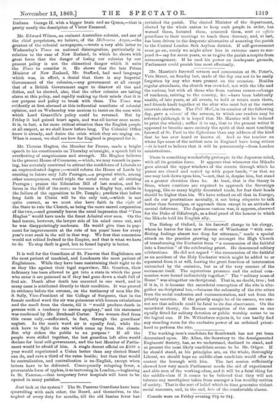The Bishop of Oxford, in his farewell charge to his
clergy, whom he leaves for the new diocese of Winchester "with con- flicting feelings almost too deep for utterance," made a special attack on the practice growing up amongst the High Church of transforming the Eucharist from "a communion of the faithful into a function" of the celebrating priest. He denounced solitary celebrations. He did not regard "the communion of the faithful as an accident of the Holy Eucharist which might be added to or separated from it at will, leaving the great function of intercession untouched by the omission, but as of the very essence of the sacrament itself. The mysterious presence and the actual com- munion were bound indissolubly together." The "solitary mass of Rome" was altogether un-Scriptural. That is, no doubt, true ; but if it is, it is because the sacerdotal conception of the rite is alto- gether un-Scriptural too,—because the solemnity of the rite arises from the social confession and commemoration, and not from the priestly sanction. If the priestly magic be of its essence, we can- not see that solitude could be fatal to its due observance. On the sacerdotal theory, the Roman conception of the mass as one equally fitted for solitary devotion or public worship seems to us the logical one. If Dr. Wilberforce rejects it, he can hardly find any standing room for the exclusive power of an ordained priest- hood to perform the rite.


































 Previous page
Previous page